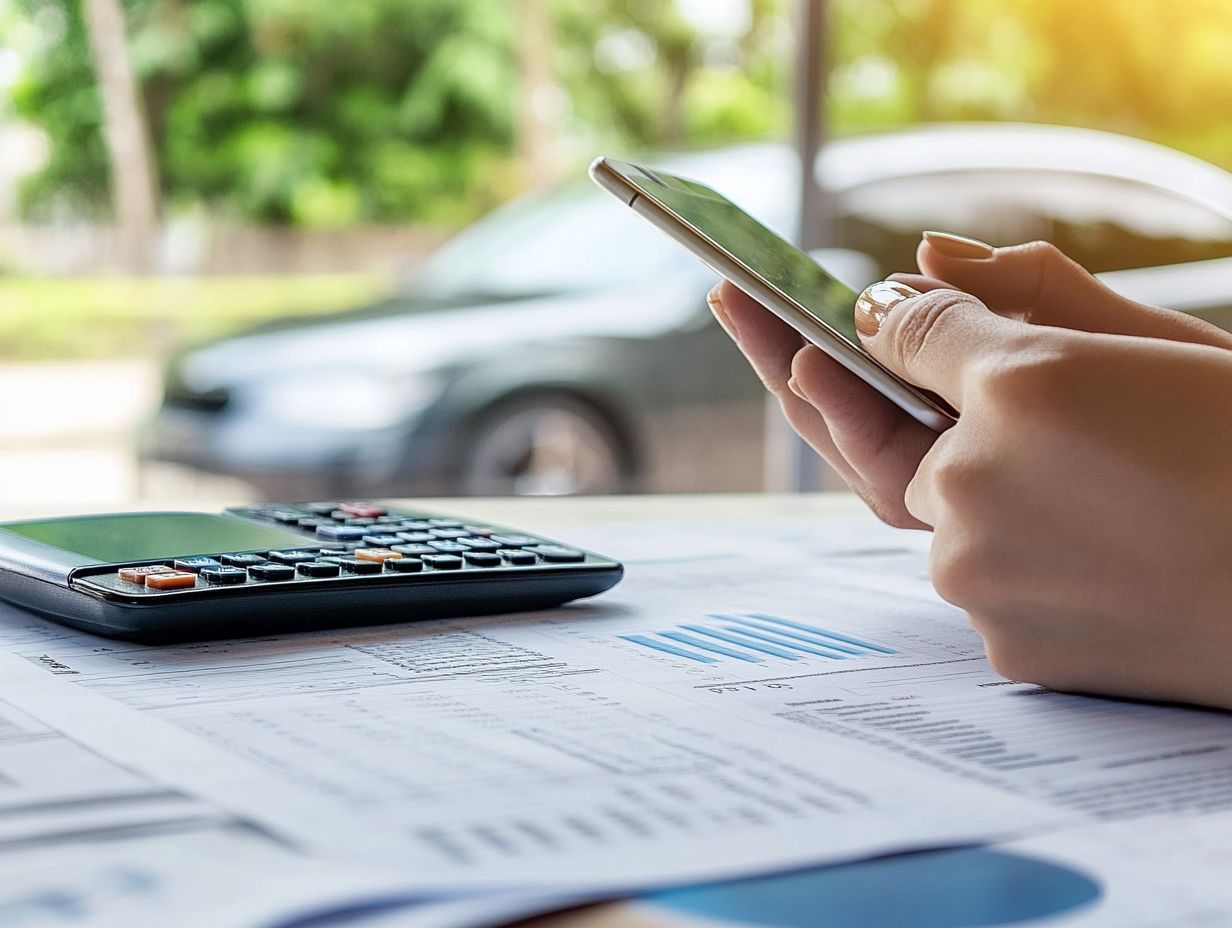How to Buy a Used Car with a Loan
Purchasing a used car can be both thrilling and daunting! Let’s explore the exciting benefits of securing a loan for your used vehicle. This approach can help you save money and land a more favorable deal.
You ll discover key factors to consider, essential steps to prepare, and valuable tips for maneuvering through the loan application process. From selecting the perfect car to negotiating the best price, this guide is designed to pave the way for a seamless buying experience.
Contents
- Key Takeaways:
- Benefits of Buying a Used Car with a Loan
- Factors to Consider Before Buying a Used Car with a Loan
- Steps to Take Before Applying for a Loan
- Applying for a Loan for a Used Car
- Choosing the Right Used Car
- Negotiating the Purchase Price
- Finalizing the Purchase with the Loan
- Frequently Asked Questions
- What is the process for buying a used car with a loan?
- How can I improve my chances of getting approved for a car loan?
- What should I look for when buying a used car with a loan?
- Can I negotiate the price of a used car when buying with a loan?
- What is the difference between a used car loan and a new car loan?
- What are the benefits of buying a used car with a loan instead of paying in cash?
Key Takeaways:

- Be prepared and do your research before applying for a loan to buy a used car. Consider your budget, needs, and preferences to ensure you make a wise investment.
- Negotiating the purchase price is key to getting the best deal on a used car. Be aware of the factors to consider and ask the right questions to get the most value for your money.
- Completing the necessary paperwork and final steps is important when finalizing the purchase of a used car with a loan. Make sure you have all the required documents and understand the loan requirements before signing any agreements.
Benefits of Buying a Used Car with a Loan
Purchasing a used car with a loan opens up a world of advantages. You can access affordable loan rates and find certified pre-owned vehicles that are inspected and certified by the manufacturer. For more details on financing, check out this guide on how to secure a used car loan. These financial insights enable more informed decisions.
By capitalizing on benefits such as lower purchase prices and flexible financing options, you can secure the best value for your investment. You can achieve peace of mind by thoroughly checking vehicle history reports and essential checks, ensuring you drive away with confidence in your choice!
Saving Money and Getting a Better Deal
To save money on a used car, honing your negotiation skills and grasping the average market price are critical strategies that can lead to substantial savings. These tactics help you get a better deal and keep you informed about the market.
Start your journey by exploring online platforms that provide average prices for similar models in your area. This gives you a solid baseline to work from during negotiations. It’s also essential to keep track of the vehicle s maintenance costs; understanding these expenses can significantly impact your overall financial commitment.
Moreover, reading used car reviews from various sources can provide you with valuable insights into reliability and dealer trustworthiness, ultimately guiding you toward smarter choices.
Factors to Consider Before Buying a Used Car with a Loan
Before you purchase a used car with a loan, several key factors deserve your attention, as they can profoundly impact your financial decisions. Begin by clearly defining your budget for the car, and give careful thought to assessing the trade-in value of your current vehicle. Additionally, it’s crucial to understand what to know about used car financing to make informed choices.
It’s also essential to review vehicle history reports and safety ratings these insights can be invaluable. By grasping these elements, you ll ensure that your purchase not only fits your financial situation but also aligns with your long-term goals.
Budget, Needs, and Preferences
Establishing a budget for your car purchase is essential for aligning your needs and preferences with your financial capabilities. This process enables you to navigate through various options, including certified pre-owned vehicles and anticipated maintenance costs.
When budgeting for a vehicle, it s crucial to look beyond just the initial purchase price. Consider additional expenses like insurance, fuel, taxes, and ongoing maintenance. Your commuting habits, family size, and lifestyle will significantly influence both your vehicle choice and overall budget.
Certified pre-owned options strike a balance, offering lower purchase prices along with the peace of mind that comes from a manufacturer s warranty, alleviating worries about unexpected repairs. By carefully analyzing these factors, you can create a comprehensive financial plan that addresses your immediate needs as well as long-term goals, ensuring a sustainable and enjoyable ownership experience.
Ready to find your perfect used car? Start exploring today!
Steps to Take Before Applying for a Loan

Before you dive into applying for a loan for a used car, it’s crucial to take some thoughtful steps. Start by researching cars online to identify your options and check out this guide on how to choose the right used car.
Make sure to utilize a comprehensive car inspection checklist. This will help ensure you’re making a sound purchase.
Explore dealer financing options as well, and don t forget to seek out prequalified auto loan opportunities. This approach can simplify the financing process, making it more efficient and tailored to your needs.
Researching and Preparing for the Process
Researching cars online is an essential step in your used car buying journey. It allows you to dive into vehicle history reports, read honest reviews, and grasp the value of certified used cars.
Considering auto loan preapproval options can help you secure better financing deals. Engaging in thorough online research enables you to make informed decisions and spot potential issues before they become headaches.
For example, using platforms that aggregate vehicle history can uncover previous accidents or title discrepancies, ensuring you have peace of mind.
By reading comprehensive reviews from other buyers, you can assess reliability and performance, tailoring your choices to meet your specific needs. Combining these insights with tools for price comparison and financing interest rates enables you to navigate the complexities of the car-buying process with greater confidence and effectiveness.
Applying for a Loan for a Used Car
Applying for a loan for your dream used car? Understanding the ins and outs of auto loan rates is your ticket to smart financing! If you’re considering a new vehicle instead, check out this guide on how to finance a new car purchase. You’ll need to adhere to specific requirements and gather the necessary documentation.
As you navigate this process, consider exploring a range of financing options, from prequalified auto loans (a loan where you get an estimate of how much you can borrow before you start shopping) to dealer financing arrangements. Don’t overlook private seller financing, as it may lead to more favorable deals tailored to your needs.
Requirements and Documentation
Understanding the requirements and documentation needed for obtaining a prequalified auto loan is crucial, as it directly influences the loan rates you may receive and consequently impacts your financial choices.
When you re in the market for an auto loan, you ll typically need to gather a range of documents, such as proof of income, credit history, and identification. Each of these components is pivotal in determining the rates available to you, as lenders evaluate your creditworthiness and overall risk.
Securing preapproval for an auto loan can significantly streamline your car-buying journey, allowing you to establish your budget upfront. This kind of clarity enables you to make informed decisions, helping to prevent overspending while boosting your negotiating power with dealerships.
Grasping these nuances not only supports your financial planning but also encourages a more strategic approach to purchasing your next vehicle.
Choosing the Right Used Car
Choosing the right used car can be tricky but exciting! You ll want to assess certified used cars, evaluate maintenance costs, and understand safety ratings.
Using reviews can provide valuable insights to guide your decision-making process. Are you wondering how to maximize your investment? Consider trade-in value assessments to ensure you re maximizing your investment.
Factors to Consider and Questions to Ask

When you’re in the market for a used car, it’s essential to consider a variety of factors to make a smart purchase. You’ll want to look into car safety ratings, vehicle history reports, and used car reviews. Additionally, ask important questions about your financial decisions and trade-in value assessments.
Start by evaluating the safety ratings of your potential vehicles from reliable sources like the National Highway Traffic Safety Administration (NHTSA) or the Insurance Institute for Highway Safety (IIHS). These ratings can offer valuable insights into how well the car performs in crash scenarios.
Next, dive into detailed vehicle history reports from platforms like Carfax or AutoCheck. These reports will shed light on any past accidents or maintenance records that could impact the car’s reliability.
It’s also wise to consider how trade-in values can vary based on market demand, condition, and mileage. Utilizing online resources or consulting with professionals can help you get a fair assessment.
By gathering all this information, you enable yourself to make informed decisions and find a dependable vehicle that aligns with both your needs and budget.
Negotiating the Purchase Price
Negotiating the purchase price of a used car is an essential skill that requires you to use your knowledge of average used car prices, effective negotiation tactics, and insights gleaned from thorough reviews. This process not only enables you to make informed financial decisions but also ensures that you secure a fair deal.
Tips for Getting the Best Deal
To secure the best deal on a used car, you must employ effective tactics such as negotiating the price, reviewing vehicle history reports, and considering certified pre-owned vehicles.
Having auto loan preapproval enhances your financial standing, giving you an advantage in negotiations. Conducting thorough research on the market value of the vehicle you re eyeing is crucial; this knowledge enables you during discussions with the seller.
Staying informed about alternatives, like similar models or pricing in nearby areas, enables you to present effective counteroffers. Patience plays a pivotal role as well timing can significantly influence your deal. Act quickly to secure the best price before someone else snatches it up!
Shopping toward the end of the month can be particularly advantageous, as dealerships are often eager to meet sales targets. Keep an eye out for potential incentives or rebates from manufacturers; these can further boost your savings as you navigate the car-buying experience.
Finalizing the Purchase with the Loan
Finalizing the purchase of a used car with a loan requires you to follow several key steps carefully. For detailed guidance, check out how to navigate financing a used car purchase and make sure you fill out the paperwork correctly to keep everything on track.
Take the time to understand the various dealer financing options available to you and assess auto loan rates carefully. By doing so, you ll be enabled to make informed financial decisions that truly reflect your budget and long-term goals.
Completing the Paperwork and Final Steps
Completing the paperwork during the final purchase steps of a used car is crucial. This process involves understanding auto loan rates, evaluating dealer financing options, and making informed financial decisions that align with your preferences and budget.
These factors affect the vehicle’s cost and your monthly payments. They also impact your long-term financial health. Before putting pen to paper, review all documents carefully, ensuring every detail matches what you discussed.
This includes checking the vehicle history report, grasping any warranties offered, and meticulously examining the financing terms, which include interest rates and payment schedules, presented by the dealer.
By navigating these financing options thoughtfully and comparing offers, you can avoid costly missteps and facilitate a smoother transaction. Ultimately, being well-informed enables you to make choices that support your financial goals effectively.
Frequently Asked Questions

What is the process for buying a used car with a loan?
First, research and determine your budget for the car. Next, get pre-approved for a car loan, which means a lender checks your credit and agrees to lend you a certain amount.
Once you have your loan, you can start shopping for a used car that fits within your budget.
How can I improve my chances of getting approved for a car loan?
To improve your chances of getting approved for a car loan, maintain a good credit score and have a stable job. Saving for a down payment also helps.
Shop around for the best interest rates and terms from different lenders.
What should I look for when buying a used car with a loan?
When buying a used car, consider the car’s condition, mileage, and history report. Always test drive the car and have a mechanic inspect it before making a purchase.
Can I negotiate the price of a used car when buying with a loan?
Absolutely! You can negotiate the price of a used car, even if you’re using a loan.
Remember, the loan amount is based on the purchase price. A lower price may decrease the loan amount available to you.
What is the difference between a used car loan and a new car loan?
A used car loan is for purchasing a used car, while a new car loan is for a brand-new vehicle. Typically, used car loans have higher interest rates and shorter terms than new car loans.
What are the benefits of buying a used car with a loan instead of paying in cash?
Buying a used car with a loan allows you to spread the cost over several years, making it more affordable. For more information on this process, refer to understanding used car financing options, which also highlights how it can help build credit if you make timely payments.
You can use the cash you would have spent on the car to save or invest elsewhere.






